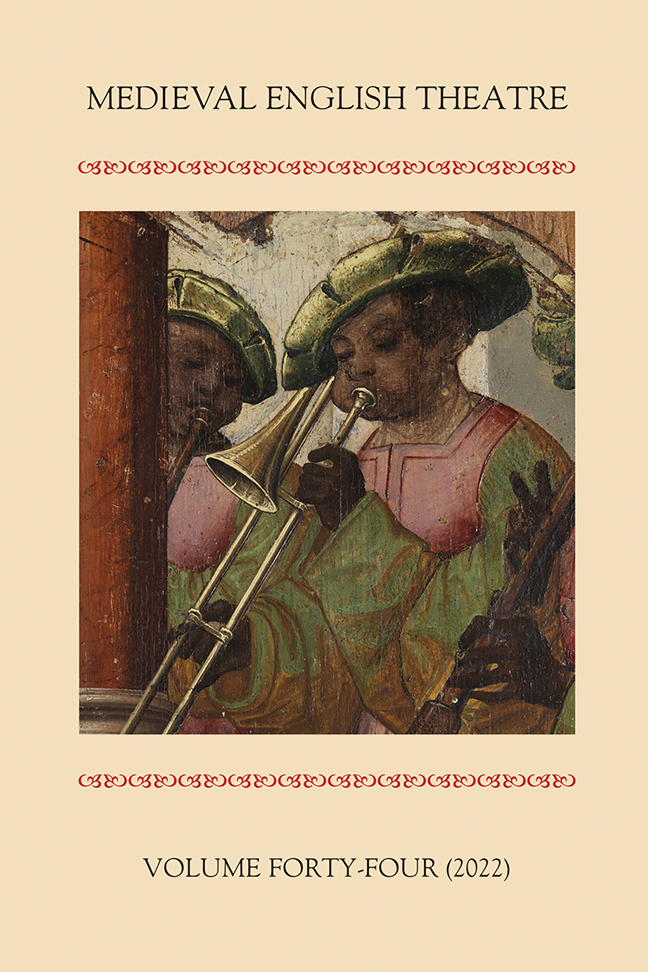Book contents
- Frontmatter
- Contents
- Illustrations
- Notes
- Common Abbreviations
- Editorial
- John Blanke's Wages: No Business Like Show Business
- Perpetually Editing Towneley: A Speculative Textual Note on Mrs Noah's ‘Stafford Blue’
- Understanding the Blanket-Toss in Medieval Drama: The Case of Een Cluijt van Lijsgen en Jan Lichthart
- Alimentary Address and the Management of Appetite and Hunger in Jacob and Esau
- Last Supper, First Communion: Some Staging Challenges in N. Town and the Huy Nuns’ Play based on Deguileville's Pèlerinage de la vie humaine
- Editorial Board (2022)
- Submission of Articles
Understanding the Blanket-Toss in Medieval Drama: The Case of Een Cluijt van Lijsgen en Jan Lichthart
Published online by Cambridge University Press: 10 January 2024
- Frontmatter
- Contents
- Illustrations
- Notes
- Common Abbreviations
- Editorial
- John Blanke's Wages: No Business Like Show Business
- Perpetually Editing Towneley: A Speculative Textual Note on Mrs Noah's ‘Stafford Blue’
- Understanding the Blanket-Toss in Medieval Drama: The Case of Een Cluijt van Lijsgen en Jan Lichthart
- Alimentary Address and the Management of Appetite and Hunger in Jacob and Esau
- Last Supper, First Communion: Some Staging Challenges in N. Town and the Huy Nuns’ Play based on Deguileville's Pèlerinage de la vie humaine
- Editorial Board (2022)
- Submission of Articles
Summary
This article, and the translation appended to it, will explore one of the most enduring riddles in medieval English drama: the significance of the canvas-tossing episode in the Towneley Second Shepherds’ Play. As the play itself makes clear, the offences of the sheep-thief and black magician Mak, and of his wife and accomplice Gill, should by rights prompt their victims to ‘do thaym to dede’; even Mak himself admits that the shepherds are entitled to ‘gyrd of my heede’. However, for some undisclosed reason, the group instead decide to ‘cast hym in canvas’. Although the shepherds’ change of heart clearly shows justice tempered with mercy, why they should moderate their punishment along these exact lines has proven difficult to determine. Criticism has struggled to know precisely what to make of the canvas penalty, generating a range of suggestions but little consensus. It has been seen as a sign of ‘contempt for an unworthy adversary’, a method of inducing miscarriage, and a reference to sifting grain that in turn evokes the Apocalypse. Even the most commonly cited interpretation, Chidamian's claim that it evokes a ‘traditional way of hastening childbirth’, has attracted as much scepticism as support. The problem is exacerbated by the lack of analogues in the theatrical record. Although there are tantalising references to the practice in popular culture more widely, as we will discuss in due course, English drama contains no scene that replicates Mak's punishment and which might provide a clue to its larger meanings; indeed, it features on the English stage in only a few passing allusions from Greene, Shakespeare, Dekker, and Jonson. To echo Jean Goodich, in the absence of any basis of comparison, the Towneley tossing is likely to remain a ‘moment that always puzzles’.
Yet, despite the absence of similar scenes in English theatre, instructive parallels can be found by looking to the continent. Especially relevant is the rich body of comic performance that emanated from the cities of the Low Countries. This rederijker (rhetorician) drama has a close kinship with medieval English performance: the two literatures overlap with one another at a number of points, to the extent that some commentators have been able to consider them aspects of a ‘common tradition’; medieval Yorkshire, in fact, seems to have been a particularly important node in this interchange, owing to its longstanding trade links with the Low Countries.
- Type
- Chapter
- Information
- Medieval English Theatre 44 , pp. 48 - 90Publisher: Boydell & BrewerPrint publication year: 2023

